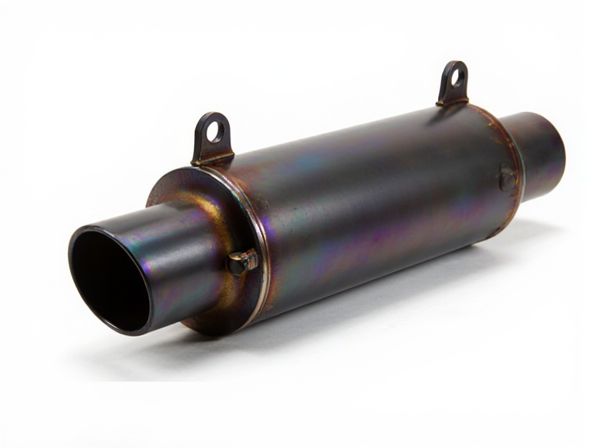
Photo illustration: Muffler Delete vs Resonator Delete
Muffler delete significantly increases exhaust noise by removing the muffler, resulting in a louder and more aggressive sound, while resonator delete primarily enhances exhaust tone without greatly affecting volume. Your choice depends on whether you prefer a deep, booming exhaust or a sharper, raspier note. Both modifications can impact backpressure and performance, so consider how each affects your vehicle's engine efficiency.
Table of Comparison
| Feature | Muffler Delete | Resonator Delete |
|---|---|---|
| Purpose | Remove muffler for louder exhaust sound | Remove resonator to enhance exhaust tone and reduce drone |
| Sound | Louder, aggressive, raw exhaust note | Deeper, sharper tone with minimized drone |
| Performance Impact | Minor horsepower gain due to reduced backpressure | Improves exhaust flow, slight horsepower improvement |
| Legal Considerations | Often illegal due to noise regulations | May violate emissions and noise standards |
| Installation Complexity | Moderate; involves cutting/muffler replacement | Simple; usually just pipe section removal |
| Impact on Fuel Economy | Minimal to no change | Minimal improvements possible |
| Drone Effect | Significant drone at cruising speeds | Reduces drone compared to muffler delete |
| Cost | Lower cost modification | Typically less expensive than muffler delete |
Introduction to Muffler Delete and Resonator Delete
Muffler delete involves removing the muffler from a vehicle's exhaust system, significantly increasing exhaust noise and potentially boosting horsepower by reducing backpressure. Resonator delete targets the resonator, a component designed to quiet specific sound frequencies, resulting in a louder and more aggressive exhaust tone without drastically impacting performance. Both modifications are popular among car enthusiasts aiming to enhance exhaust sound but differ in noise level and effect on engine efficiency.
How Muffler Delete Works
A muffler delete involves removing the muffler to reduce exhaust backpressure and increase engine sound volume by allowing exhaust gases to exit more freely. This modification typically results in a louder, more aggressive exhaust note with minimal impact on performance if done correctly. Unlike a resonator delete, which targets the mid-frequency sound waves to alter tone, a muffler delete primarily amplifies the overall exhaust noise by eliminating sound-dampening components.
How Resonator Delete Works
Resonator delete involves removing the resonator, a component designed to reduce specific sound frequencies and smooth exhaust flow, resulting in a louder and more aggressive exhaust note. By eliminating the resonator, unrestricted airflow increases, which can enhance engine performance slightly while producing a rawer exhaust tone. Unlike muffler delete, resonator delete primarily targets sound tuning rather than significant noise reduction.
Key Differences Between Muffler and Resonator Delete
Muffler delete involves removing the muffler to increase exhaust volume and improve performance, while resonator delete focuses on eliminating the resonator to alter exhaust tone without significantly impacting backpressure. The muffler primarily reduces noise and controls emissions, whereas the resonator fine-tunes exhaust sound and reduces drone. Choosing between muffler delete and resonator delete depends on desired sound levels, engine performance goals, and potential legal regulations regarding noise emissions.
Performance Impact: Muffler Delete vs Resonator Delete
Muffler delete typically results in a louder exhaust note with a minor increase in horsepower due to reduced backpressure, primarily benefiting street performance and sound customization. Resonator delete reduces mid-range sound frequencies and can improve exhaust flow more effectively than a muffler delete, leading to a slight gain in throttle response and performance efficiency. Both modifications offer performance impacts, but resonator deletes generally provide a cleaner exhaust flow improvement, while muffler deletes focus more on sound amplification.
Sound Differences: Muffler Delete vs Resonator Delete
Muffler delete produces a louder, more aggressive exhaust note with less tone control, often resulting in a raw, raspier sound. Resonator delete increases volume and enhances exhaust drone by removing the chamber designed to smooth and tune the sound, leading to a deeper, throatier tone. Comparing both, muffler delete dramatically amplifies noise levels, while resonator delete alters the exhaust timbre, emphasizing specific sound frequencies without as much overall volume increase.
Pros and Cons of Muffler Delete
Muffler delete increases exhaust noise and can improve engine performance by reducing backpressure, but it may cause loud, drone-like sounds and potentially fail emissions tests. It often results in a more aggressive, aggressive exhaust tone preferred by some enthusiasts, though it can negatively affect comfort during long drives due to noise levels. Removing the muffler might also lead to legal issues depending on local regulations regarding vehicle noise and emissions standards.
Pros and Cons of Resonator Delete
Resonator delete improves exhaust sound by increasing volume and creating a deeper, more aggressive tone, enhancing the driving experience for enthusiasts. However, removing the resonator can lead to drone and increased cabin noise, which may be uncomfortable during long drives. While it can slightly improve exhaust flow and performance, it often results in a harsher sound and may affect emissions compliance depending on local regulations.
Legal and Warranty Considerations
Muffler delete and resonator delete modifications can impact vehicle compliance with local noise regulations and emissions standards, potentially resulting in fines or failed inspections. Removing these components may void manufacturer warranties, as it alters the exhaust system and could lead to increased engine wear or damage. It is essential to review state laws and consult with the vehicle manufacturer or dealership before proceeding with either modification to avoid legal issues and maintain warranty coverage.
Choosing the Right Option: Muffler or Resonator Delete
Choosing between a muffler delete and a resonator delete depends primarily on desired sound and performance goals. Muffler deletes increase exhaust volume and aggressiveness but may result in drone and legal issues, while resonator deletes provide a deeper tone and improved flow with less cabin noise impact. Evaluating vehicle make, local regulations, and sound preference ensures the right modification for optimal exhaust performance.
 caratoz.com
caratoz.com